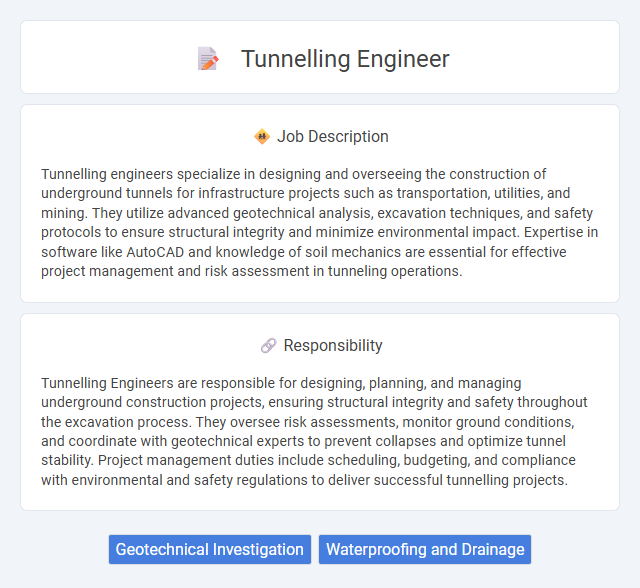
Tunnelling engineers specialize in designing and overseeing the construction of underground tunnels for infrastructure projects such as transportation, utilities, and mining. They utilize advanced geotechnical analysis, excavation techniques, and safety protocols to ensure structural integrity and minimize environmental impact. Expertise in software like AutoCAD and knowledge of soil mechanics are essential for effective project management and risk assessment in tunneling operations.
Tunnelling engineers are likely to thrive if they possess strong analytical skills, physical stamina, and a keen attention to safety protocols due to the challenging underground environments they encounter. Individuals who prefer structured, hands-on problem-solving and can manage high-pressure situations are probably well-suited for this role. However, those uncomfortable with working in confined spaces or extreme conditions might find the job less compatible with their personal preferences and abilities.
Qualification
A Tunnelling Engineer typically requires a bachelor's degree in civil engineering, geotechnical engineering, or a related field, supplemented by specialized training in tunnel design and construction techniques. Proficiency in software such as AutoCAD, PLAXIS, and GIS is essential, alongside strong knowledge of ground investigation, rock mechanics, and soil behavior. Relevant certifications like the Project Management Professional (PMP) or membership in professional bodies such as the International Tunnelling and Underground Space Association (ITA) enhance career prospects.
Responsibility
Tunnelling Engineers are responsible for designing, planning, and managing underground construction projects, ensuring structural integrity and safety throughout the excavation process. They oversee risk assessments, monitor ground conditions, and coordinate with geotechnical experts to prevent collapses and optimize tunnel stability. Project management duties include scheduling, budgeting, and compliance with environmental and safety regulations to deliver successful tunnelling projects.
Benefit
A Tunnelling Engineer likely benefits from high demand in infrastructure projects, leading to strong job security and competitive salaries. There is probably significant skill development due to exposure to complex engineering challenges and innovative technologies. Working in this role may also offer opportunities for career advancement and international experience in various tunneling environments.
Challenge
Tunnelling engineer roles likely involve significant technical and environmental challenges due to underground construction complexities. Adapting to varying geological conditions and ensuring structural stability probably demand high problem-solving skills and innovation. Managing safety risks and coordinating multidisciplinary teams may also be frequent challenges in this profession.
Career Advancement
Tunnelling Engineers specialize in designing, planning, and overseeing underground construction projects, with expertise in soil mechanics, excavation techniques, and tunnel safety protocols. Career advancement opportunities include progressing to senior engineering roles, project management positions, and consultancy roles within infrastructure development firms. Gaining certifications in geotechnical engineering and advanced project management enhances prospects for leadership and involvement in large-scale urban tunneling projects.
Key Terms
Geotechnical Investigation
Tunnelling engineers specialize in designing and constructing underground passages, relying heavily on geotechnical investigation to assess soil and rock properties, groundwater conditions, and structural stability. Detailed site analysis using techniques such as borehole drilling, geophysical surveys, and laboratory testing informs risk management and excavation methods. Accurate geotechnical data ensures safe, cost-effective tunnelling by predicting ground behavior and preventing structural failures.
Waterproofing and Drainage
Tunnelling Engineers specializing in waterproofing and drainage design and implement systems that prevent water ingress and manage groundwater effectively within underground construction projects. Expertise in selecting durable waterproof membranes, drainage pipes, and sealing techniques ensures tunnel integrity and longevity under varying hydrogeological conditions. Mastery of hydrostatic pressure analysis and subsurface water control methods is essential to maintain structural safety and operational functionality.
 kuljobs.com
kuljobs.com